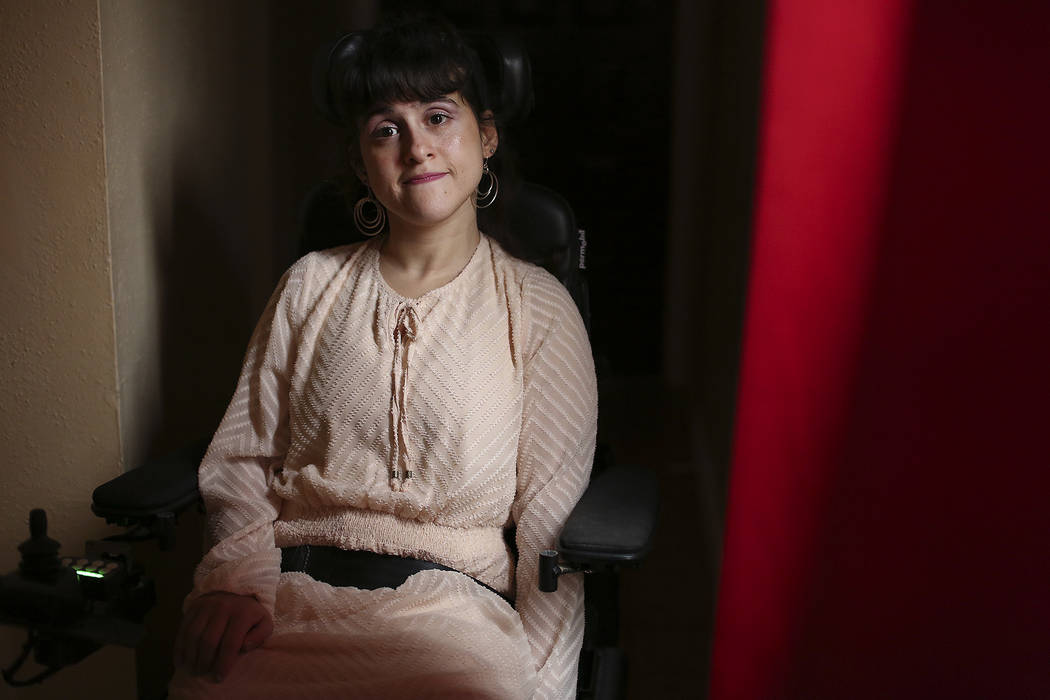Victims of indicted attorney Robert Graham suffer hardship
Wheelchair bound, with cerebral palsy since birth, Sharona Dagani no longer takes frequent trips to buy groceries and attend church.
The former Las Vegas woman, 29, has no money to fix a broken-down van her caregivers use to take her on errands.
And she can’t afford to pay those caregivers for a large portion of the help she needs to get through each day with a neurological disorder that has left her with an impaired voice and limited use of her hands and legs.
It all went away in December after probate attorney Robert Graham abruptly shut down his Lawyers West office in Summerlin, leaving Dagani without the remaining $476,423 in her special needs trust.
Dagani, who now lives in Texas, is one of hundreds of former clients whose funds authorities say were stolen by Graham. In all, he is accused of taking $17.2 million over at least a decade from clients who trusted him to guard their savings.
The victims include three young children who survived a car crash that killed their parents in 2010 and the heirs to an estate that was to be their security in retirement.
In interviews with the Las Vegas Review-Journal, Dagani and other victims described their frustration with Graham as they fought, sometimes desperately, to get him to turn over their funds in the years and final months before he closed his law practice.
“He stole millions of dollars to feed his ego and desires for wealth and power, and he used his law license to do it,” Janeen Isaacson, a prosecutor for the State Bar of Nevada, said at a disciplinary hearing for Graham last month. “He projected his image through advertisements, expensive houses, nice suits and other trappings of success, but he didn’t get those things through talent and hard work. He got them off the backs of his clients.”
Clark County prosecutors charged Graham, 52, in January with the theft of $2.1 million in three of his cases, with more potential charges on the horizon. He remains in custody on $5 million bail and faces disbarment.
Until Graham walked away from his law practice, Dagani said, she was using about $300 a month from her trust fund to pay an array of personal expenses. The fund also paid for her auto insurance and maintenance for the van and powered wheelchair.
The extra cash helped her maintain control of her life, control she said she is losing.
“Instead of being the boss, I’m now at the caregivers’ mercy,” said Dagani, who corresponded with the Review-Journal in emails and telephone calls.
Cutting back care
Dagani said she relies on her caregivers from the time she wakes up until she goes to sleep.
On a typical day at her rented home in San Antonio, she needs help getting out of bed, going to the bathroom, brushing her teeth, combing her hair and making meals. Caregivers also do her housekeeping and laundry and help with her online business selling decorative fingernail wraps.
Medicaid covers 51 hours a week in home care for Dagani, about 20 hours less than what she needs. She has no money to pay her three caregivers for the additional time. She has had to cut back on the more pleasurable things in her life, such as shopping for clothes, attending concerts, and taking vacations.
Dagani said she relies on $155 a month in food stamps when she’s able to buy groceries at a store near her home, but doesn’t have money for basic items such as shampoo, soap and toothpaste. She has a 51-inch flat screen television but can’t watch it because she has no money to pay her cable bill.
Her mother, Joan Albstein, who lives in New York where Dagani was born, said she has been trying to help fill the financial void, but doesn’t have the money to pitch in much longer.
Albstein, 62, an elementary school teacher, said she paid for a scaled-down version of her daughter’s auto insurance and has supplemented the salary of her caretakers.
“I was determined not to see her lose what she had become used to,” Albstein said.
She said her daughter had a series of setbacks after she was diagnosed with cerebral palsy. Her father abandoned the family when she was 1. At age 3, she had surgery to correct a cross-eyed condition. And when she was 11, Dagani had a cancerous tumor removed from her lower intestine.
“Despite everything she’s been through, she always wakes up with a smile on her face,” Albstein said.
This time, Dagani is counting on her religious faith to get her through her growing financial difficulties.
“I have to believe that God will take care of my needs,” she said.
But she may need more than faith.
Lawyers for Dagani and other victims pursuing the bankrupt law firm’s assets said there is slim chance of recovering the bulk of the missing funds from Graham. In bankruptcy court papers, Lawyers West listed $8.7 million in liabilities, but only $438,000 in assets, mostly in unpaid bills unlikely to be collected.
The company that issued a $2 million malpractice policy to Graham is now trying to void it, claiming he fraudulently obtained the coverage.
Former clients also are not likely to receive restitution if Graham is convicted in the criminal case, Clark County District Attorney Steve Wolfson said.
“They lost money and they deserve to have their money returned, but if there isn’t any money to return, there’s not much we can do about it,” Wolfson said.
There is also little the state bar can do to recover any money. Former clients can apply for money from a state bar security fund, but clients can not recover more than $50,000.
Dagani’s trust was started with $2 million from a medical malpractice settlement the family obtained in New York over complications at her birth that caused cerebral palsy.
“When the special needs trust was created, I thought she was set for the rest of her life, but here we go again,” Albstein said. “She’s been a victim of medical malpractice and now legal malpractice.”
Scott Cantor, the attorney who set up Dagani’s trust in Las Vegas in 2003, said he believes most of the original $2 million principal should have been in the trust when Graham closed his law firm.
Until Graham took over as the trustee in 2012, Dagani was only receiving money from the interest on the account, said Cantor, who on Friday helped her set up a GoFundMe account to raise $1 million.
“I can understand how someone can be in a pinch and look for an easy way to solve a problem, but it’s beyond my comprehension that a lawyer who had taken an oath would victimize a client who had already been victimized,” Cantor said. “He took an oath to do the opposite.”
Grand jury transcripts in the criminal case allege that Graham funneled an average of $187,000 a month in client funds into an account to run his law practice and pay personal bills.
At Graham’s disciplinary hearing, state bar investigator Louise Watson testified that he shuffled funds from one trust account to another to hide the missing money.
Most of the time he kept his clients in the dark about their accounts and, when pressed, responded with threats and excuses. The most common excuse was that he was waiting to resolve tax issues with the funds, Watson testified.
Graham’s lawyer, Deputy Public Defender Bryan Cox, said he was still reviewing evidence in the criminal case and was not prepared to comment.
Dagani said her concerns about Graham’s handling of her trust grew after her move to San Antonio in 2013. Graham consistently refused to give her an accounting of the funds and was slow to write checks to pay her caregivers.
She said he also sold her Las Vegas home without informing her and she suspects he kept the money. Records show Graham sold the home for $290,000 in December 2014.
Days after Graham closed his office, Dagani said, she received a troubling response to an email she had sent him inquiring about her funds.
“First know that I have worked tirelessly to provide for you and protect you in all that has occurred,” Graham wrote, as he acknowledged his firm was bankrupt. “You need to immediately ask for assistance from your friends and members of your church. You need to rely on all government programs going forward.”
Then, he concluded, “I pray that you will overcome these obstacles and find happiness.”
Denying funds for orphans
For other former Graham clients, the missing money compounds the tragedy of earlier losses.
In August 2010, Micaela Miller, 9, Noah Miller, 5, and Madison Miller, 18 months, were in the back seat of their family’s F-350 pickup truck on their way to a cousin’s birthday party in Ontario, California. Their mother, Sheila Miller, 39, an accomplished musician and artist, was driving. Their father, Kenneth Miller, 37, a veteran iron worker and supervisor, was asleep in the front passenger seat.
As they headed to the California border near Primm, a tire blew out and the truck slammed into paving equipment on the side of Interstate 15.
Both parents died in the crash. Micaela suffered a punctured lung, lacerated liver, broken ribs and a perforated bowel. Noah wound up with a broken clavicle and little Madison escaped serious injury.
All three children recovered and were placed in the custody of their grandmother, Victoria Pappalardo, and her husband, Tony Pappalardo, who moved them into their modest home in Ontario. They turned to Graham to oversee the $1 million trust fund set up with insurance money from the parents.
The fund was supposed to help the Pappalardos raise the children and pay for their education. But almost from the start Graham balked at giving them the money they needed, the couple said.
When they sought money to buy a Ford Expedition with room for the children, Graham refused to give it to them, the Pappalardos said. Graham told them they needed to take out a loan, with the trust as collateral.
He gave the same advice when they asked for cash to add a fourth bedroom to their home, but the grandparents said they later learned the advice was phony and Graham should have given them access to the trust funds.
When they asked for $30,000 for expenses to take care of the children, Graham also found reason not to give them the money, the Pappalardos said. Even a court order failed to persuade Graham to turn over funds.
“I had to retire and apply for social security because we weren’t getting any money,” the 66-year-old Victoria Pappalardo said. “He was always giving us excuses.”
Then, she learned that Graham had shut down his office.
“I was numb. I was in absolute disbelief,” Pappalardo said. “Kenny and Sheila worked very hard to make sure their children were cared for. To have this man steal like this, it’s so hard to wrap your mind around something like this — that this man could do that.”
Pappalardo said the theft of her grandchildren’s trust was even harder to understand because Graham and his staff gave her the impression that he was concerned about the kids.
“They said you worry about taking care of the children,” she explained. “We’ll take care of your finances.”
But Tony Pappalardo, 55, said that was only a front.
“He said he was doing everything in the best interest of the children, but he did everything in his own best interest. He was only thinking about himself,” Pappalardo said.
Victoria Pappalardo said her disbelief turned into anger after she saw Graham quoted in a Review-Journal story portraying himself as a victim of a bad economy.
“He’s not a victim,” she said. “He embezzled from orphans and needy people just to sustain his lifestyle.”
Losing their parents has been tough on the children, the Pappalardos said. All three are in counseling to help them cope without their parents.
The sudden disappearance of money has robbed other victims of their sense of security.
Fear and worries mount
Caralinda Lee and her sister, Valerie Weinberg, said they and their brother have dealt with daily stress since learning that $595,596 in funds from the estate of Lois Lee, their stepmother, are missing. Each was to receive $130,000, with the rest going to their step-siblings.
“The three of us have all been suffering from, among other things, significant feelings of rage, bewilderment and betrayal,” said Lee, a 67-year-old widow and college professor who lives in San Francisco. “Though the reality is gradually settling in, we still often find ourselves in a state of complete disbelief about these rather ironic circumstances in which a trusted servant of the law, someone who is licensed to represent the interest of others, can behave so egregiously against the laws that he is professionally obligated to defend.”
Weinberg, 64, a Sacramento jazz singer and booking agent, said she loses sleep at night worrying about life in retirement.
“The idea of being single, alone and entirely supporting myself on a very limited income can be very scary,” she said. “I was relying on this for a cushion for the future.”
Added Lee: “While we will by no means be poor or lacking in the basic necessities of life, we must be far more frugal and careful and cannot undertake some things that might have made our lives easier and more comfortable.”
Like other victims, Weinberg and Lee said Graham frequently ducked their inquiries.
“I kept calling him, but he wouldn’t return my calls,” Weinberg said. “We got so frustrated because we weren’t getting answers and we weren’t getting any money.”
Through it all, some former clients insist they have no ill feelings toward Graham.
“It’s not for me to take vengeance,” Sharona Dagani said. “He’ll have to answer to Almighty God one day, which is a fearful thing if he doesn’t sincerely repent before that day.”
Victoria Pappalardo agreed.
“We’re not looking for revenge,” she said. “We forgive him. We absolutely forgive him. But we just don’t want him to hurt people again.”
Contact Jeff German at jgerman@reviewjournal.com or 702-380-4564. Follow @JGermanRJ on Twitter.




































